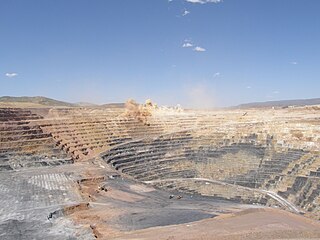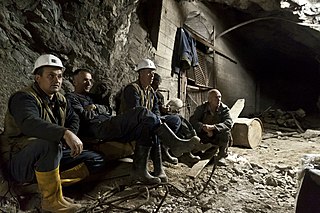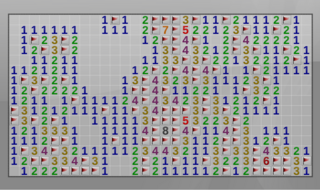
A land mine is an explosive device concealed under or on the ground and designed to destroy or disable enemy targets, ranging from combatants to vehicles and tanks, as they pass over or near it. Such a device is typically detonated automatically by way of pressure when a target steps on it or drives over it, although other detonation mechanisms are also sometimes used. A land mine may cause damage by direct blast effect, by fragments that are thrown by the blast, or by both. Landmines are typically laid throughout an area, creating a minefield which is dangerous to cross.

Mining is the extraction of valuable geological materials from the Earth and other astronomical objects. Mining is required to obtain most materials that cannot be grown through agricultural processes, or feasibly created artificially in a laboratory or factory. Ores recovered by mining include metals, coal, oil shale, gemstones, limestone, chalk, dimension stone, rock salt, potash, gravel, and clay. Mining in a wider sense includes extraction of any non-renewable resource such as petroleum, natural gas, or even water.

The Northwest Territories is a federal territory of Canada. At a land area of approximately 1,144,000 km2 (442,000 sq mi) and a 2016 census population of 41,790, it is the second-largest and the most populous of the three territories in Northern Canada. Its estimated population as of 2022 is 45,605. Yellowknife is the capital, most populous community, and only city in the territory; its population was 19,569 as of the 2016 census. It became the territorial capital in 1967, following recommendations by the Carrothers Commission.

A naval mine is a self-contained explosive device placed in water to damage or destroy surface ships or submarines. Unlike depth charges, mines are deposited and left to wait until they are triggered by the approach of, or contact with, any vessel or a particular vessel type, akin to anti-infantry vs. anti-vehicle mines. Naval mines can be used offensively, to hamper enemy shipping movements or lock vessels into a harbour; or defensively, to protect friendly vessels and create "safe" zones. Mines allow the minelaying force commander to concentrate warships or defensive assets in mine-free areas giving the adversary three choices: undertake an expensive and time-consuming minesweeping effort, accept the casualties of challenging the minefield, or use the unmined waters where the greatest concentration of enemy firepower will be encountered.

The Claymore mine is a directional anti-personnel mine developed for the United States Armed Forces. Its inventor, Norman MacLeod, named the mine after a large medieval Scottish sword. Unlike a conventional land mine, the Claymore is command-detonated and directional, meaning it is fired by remote-control and shoots a wide pattern of metal balls into the kill zone. The Claymore can also be victim-activated by booby-trapping it with a tripwire firing system for use in area denial operations.

Potash includes various mined and manufactured salts that contain potassium in water-soluble form. The name derives from pot ash, plant ashes or wood ash soaked in water in a pot, the primary means of manufacturing potash before the Industrial Era. The word potassium is derived from potash.

Franklin County is a county in Southern Illinois. At the 2020 census, it had a population of 37,804. The largest city is West Frankfort and the county seat is Benton. This area of Southern Illinois is known locally as "Little Egypt".

BHP Group Limited is an Australian multinational mining, metals, natural gas petroleum public company that is headquartered in Melbourne, Victoria, Australia.

Coal mining is the process of extracting coal from the ground. Coal is valued for its energy content and since the 1880s has been widely used to generate electricity. Steel and cement industries use coal as a fuel for extraction of iron from iron ore and for cement production. In the United Kingdom and South Africa, a coal mine and its structures are a colliery, a coal mine is called a 'pit', and the above-ground structures are a 'pit head'. In Australia, "colliery" generally refers to an underground coal mine.

Open-pit mining, also known as open-cast or open-cut mining and in larger contexts mega-mining, is a surface mining technique of extracting rock or minerals from the earth from an open-air pit, sometimes known as a borrow.

A minesweeper is a small warship designed to remove or detonate naval mines. Using various mechanisms intended to counter the threat posed by naval mines, minesweepers keep waterways clear for safe shipping.

A miner is a person who extracts ore, coal, chalk, clay, or other minerals from the earth through mining. There are two senses in which the term is used. In its narrowest sense, a miner is someone who works at the rock face; cutting, blasting, or otherwise working and removing the rock. In a broader sense, a "miner" is anyone working within a mine, not just a worker at the rock face.

The Colorado School of Mines, informally called Mines, is a public research university in Golden, Colorado, founded in 1874. The school offers both undergraduate and graduate degrees in engineering, science, and mathematics, with a focus on energy and the environment. While Mines does offer minor degrees in the humanities, arts, and social sciences, it only offers major degrees in STEM fields, with the exception of economics. In the Fall 2022 semester, the school had 7,408 students enrolled, with 5,733 in an undergraduate program and 1,675 in a graduate program. The school has been co-educational since its founding, however, enrollment remains predominantly male. In every QS World University Ranking from 2016 to 2022, the university was ranked as the top institution in the world for mineral and mining engineering. It is classified among "R1: Doctoral Universities – Very high research activity".

"Sweet Child o' Mine" is a song by American rock band Guns N' Roses. It appears on their debut album, Appetite for Destruction. In the United States, the song was released in June 1988 as the album's third single, topping the Billboard Hot 100 chart and becoming the band's only US number-one single. In the United Kingdom, the song was released in August 1988, reaching number 24 on the UK Singles Chart the same month. Re-released there in May 1989, it peaked at number six.

A minelayer is any warship, submarine or military aircraft deploying explosive mines. Since World War I the term "minelayer" refers specifically to a naval ship used for deploying naval mines. "Mine planting" was the term for installing controlled mines at predetermined positions in connection with coastal fortifications or harbor approaches that would be detonated by shore control when a ship was fixed as being within the mine's effective range.

Rio Tinto Group is an Anglo-Australian multinational company that is the world's second-largest metals and mining corporation. The company was founded in 1873 when of a group of investors purchased a mine complex on the Rio Tinto, in Huelva, Spain, from the Spanish government. It has grown through a long series of mergers and acquisitions. Although primarily focused on extraction of minerals, Rio Tinto also has significant operations in refining, particularly the refining of bauxite and iron ore. Rio Tinto has joint head offices in London and Melbourne.

Gold mining is the extraction of gold resources by mining. Historically, mining gold from alluvial deposits used manual separation processes, such as gold panning. However, with the expansion of gold mining to ores that are not on the surface, has led to more complex extraction processes such as pit mining and gold cyanidation. In the 20th and 21st centuries, most volume of mining was done by large corporations, however the value of gold has led to millions of small, artisanal miners in many parts of the Global South.
A limpet mine is a type of naval mine attached to a target by magnets. It is so named because of its superficial similarity to the shape of the limpet, a type of sea snail that clings tightly to rocks or other hard surfaces.

Tunnel warfare involves war being conducted in tunnel and other underground cavities. It often includes the construction of underground facilities in order to attack or defend, and the use of existing natural caves and artificial underground facilities for military purposes. Tunnels can be used to undermine fortifications and slip into enemy territory for a surprise attack, while it can strengthen a defense by creating the possibility of ambush, counterattack and the ability to transfer troops from one portion of the battleground to another unseen and protected. Also, tunnels can serve as shelter from enemy attack.

Minesweeper is a logic puzzle video game genre generally played on personal computers. The game features a grid of clickable squares, with hidden "mines" scattered throughout the board. The objective is to clear the board without detonating any mines, with help from clues about the number of neighboring mines in each field. Variants of Minesweeper have been made that expand on the basic concepts, such as Minesweeper X, Crossmines, and Minehunt. Minesweeper has been incorporated as a minigame in other games, such as RuneScape and Minecraft's 2015 April Fools update.


















